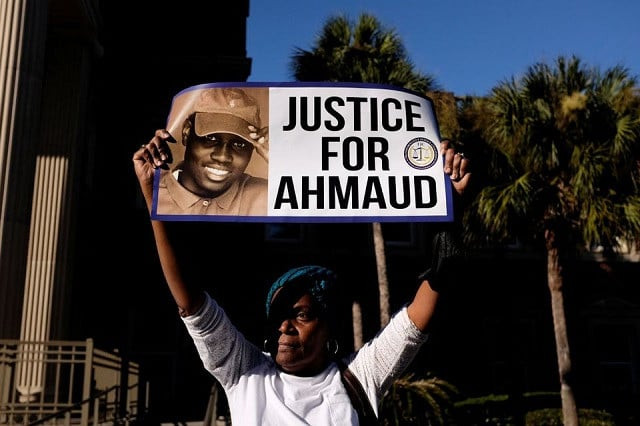Family of Ahmaud Arbery wants racial justice as murderers face new trial
Activist says new trial is a key moment in the country’s reckoning with racial injustice

The family of Ahmaud Arbery, a Black jogger who was chased by three white men in pickup trucks and gunned down in south Georgia in 2020, says that the men’s federal hate crimes trial will do what the state court did not - reckon with race.
The three men - a father and son and their neighbor - were convicted last November in a Brunswick, Georgia state court of murdering Arbery, 25, and sentenced to life in prison.
“That’s not enough,” said Arbery’s father, Marcus Arbery, who believes issues of race raised in the new trial may have an impact beyond the courtroom.
“My son isn’t coming back,” but “maybe it’ll save another Black son,” he said.
Civil rights activists say the new trial, which begins on Feb. 7, is a key moment in the country’s reckoning with racial injustice. Arbery’s murder was another example of deadly violence being used against a Black man, they say.
Gregory McMichael, 66, a former police officer, his son Travis McMichael, 36, and William “Roddie” Bryan, 52, are each charged with interference with rights, a hate crime which carries a maximum of life in prison. All are also charged with attempted kidnapping, and the McMichaels face gun violations.
Read George Floyd murder: Jury finds ex-officer Chauvin guilty on all counts
All three have pleaded not guilty to all charges. Their attorneys have declined to comment to Reuters.
Carol Anderson, an Emory University professor of African American studies who has watched the case closely, said the trial was “absolutely necessary” even though the men had already been convicted of murder.
“We must be clear, it was his blackness that put him in the crosshairs of these men,” Anderson said. “And that makes this a hate crime. This is part of the truth telling that society must have.”
The McMichaels and Bryan told police they thought Arbery was a burglar and that they tried to detain him as he ran through their mostly white Satilla Shores neighborhood. Arbery was shot after a five-minute chase by the men in their trucks. The McMichaels claimed Arbery grappled with the shotgun leveled by Travis McMichael, who fired the weapon.
In the six-week state trial, the prosecution largely avoided race. Prosecutor Linda Dunikoski mentioned it once in her closing arguments. The men attacked Arbery “because he was a Black man running down the street,” she said.
Dunikoski has not commented publicly on why she avoided race. In pre-trial hearings state prosecutors had reserved the option to introduce evidence of racial animus, including Travis McMichael’s vanity license plate featuring the flag flown by the southern pro-slavery Confederacy during the 1861-1865 Civil War. Today it is viewed by some as a symbol of white supremacism and by others a reminder of their Southern heritage.
In an arraignment hearing in 2020, Special Agent Richard Dial of the Georgia Bureau of Investigation said Bryan told his office that Travis McMichael uttered a racial slur as Arbery lay dying.
Dial also told the court that he had evidence from social media and elsewhere that Travis McMichael had used racial slurs in the past.
It is not clear whether the vanity plate or Dial’s evidence will be featured in the new trial.
In recent closed-door pre-trial hearings, defense attorneys have argued over what evidence can and cannot be presented to the jury. Court documents on the pleadings have been sealed.



















COMMENTS
Comments are moderated and generally will be posted if they are on-topic and not abusive.
For more information, please see our Comments FAQ